They Came From The Four Corners Of Malaysia To Protest Against The EU
They came from Sarawak, Kedah, Perak, Pahang, Negeri Sembilan and Johor. They came because their livelihood is at stake. They came for their school-going children who may suffer once the EU ban on palm oil biofuels, and an unattainable single certification from 2020 is put in place.
 Almost 2,000-strong smallholders came to Kuala Lumpur on 16 January 2018 to protest against the EU, and to hand over a memorandum to the EU Ambassador in the federal capital. They represent 650,000 smallholders and 3.6 million people who rely on the palm oil industry. The protestors comprise 4 national palm oil planting associations : SALCRA (Sarawak Land Consolidation and Rehabilitation Authority), FELDA (Federal Land Development Authority), DOPPA (Dayak Oil Palm Planters Association), and NASH (National Association of Smallholders Malaysia).
Almost 2,000-strong smallholders came to Kuala Lumpur on 16 January 2018 to protest against the EU, and to hand over a memorandum to the EU Ambassador in the federal capital. They represent 650,000 smallholders and 3.6 million people who rely on the palm oil industry. The protestors comprise 4 national palm oil planting associations : SALCRA (Sarawak Land Consolidation and Rehabilitation Authority), FELDA (Federal Land Development Authority), DOPPA (Dayak Oil Palm Planters Association), and NASH (National Association of Smallholders Malaysia).
They came because they cannot understand why the EU is doing this?
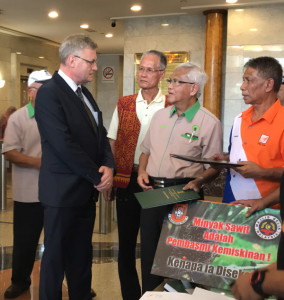 They came because they know what it is like to live in extreme poverty. They were very poor before they started cultivating oil palm. The numerous government-backed oil palm planting schemes have lifted them out of poverty. The United Nations and World Bank have acknowledged that Malaysia’s agricultural scheme is unprecedented in alleviating rural poverty which started way back in the 1960s. These two global organisations have also acknowledged that Malaysia has achieved excellent forest management and efficient, sustainable land usage and best plantation practices for its agricultural sectors, especially oil palm cultivation.
They came because they know what it is like to live in extreme poverty. They were very poor before they started cultivating oil palm. The numerous government-backed oil palm planting schemes have lifted them out of poverty. The United Nations and World Bank have acknowledged that Malaysia’s agricultural scheme is unprecedented in alleviating rural poverty which started way back in the 1960s. These two global organisations have also acknowledged that Malaysia has achieved excellent forest management and efficient, sustainable land usage and best plantation practices for its agricultural sectors, especially oil palm cultivation.
The protestors want to defend their right to be free of poverty as guaranteed by the United Nations Sustainable Development Goals (SDG). Ironically, the EU is proposing the ban and single stringent certification based on this very same Sustainable Development Goals.
Tan Sri Shahrir Abdul Samad, the Chairman of FELDA, called this ban an economic colonialism because the EU has no reason whatsoever to ban palm oil. Citing the United Nations SDG as the basis for the ban, Tan Sri Shahrir said that every point of the UN SDG has been met by Malaysia; not only achieved the criteria but has gone beyond the minimum criteria set by the UN. For example, the UN SDG states that the country must maintain 30% forest cover. Malaysia has more than 50% forest cover, and has pledged 50% minimum forest cover in perpetuity. Yet the #1 SDG is to eradicate poverty in all forms, while the EU ban will impoverished thousands of smallholder communities throughout Malaysia.
Oil palms once planted will thrive for 25 years. Unlike EU’s crops that have to be cleared and replanted every year. Tan Sri Shahrir said Malaysia signed and actively participated in the Paris Climate Change COP23, and upholds all the criteria of the UN SDG. Malaysia also has excellent forest management, better than any EU member countries as acknowledged by the UN and the World Bank.
The unilateral action of the EU is hypocrisy and goes against world trade agreements, the UN objectives and even EU’s own trade policy, which stipulated working together with all countries to achieve mutual benefits respectively. The EU also stated that the region was plagued by haze as a result of open burning in 2015. Yet there was no haze in 2016 and 2017. Shouldn’t that be seen as an achievement and the concerted efforts of countries that were affected? Malaysia has fulfilled every criteria of the UN SDG backed by scientific research and has proven that palm oil is superior to other oilseed oils, and the only reason for the EU ban is purely protectionism.
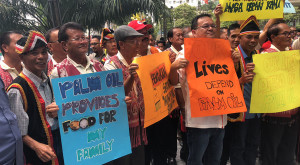 103,000 FELDA smallholders signed the petition to protest the EU ban. And this is just one smallholder association. Malaysia has 6 smallholder associations representing 650,000 smallholders.
103,000 FELDA smallholders signed the petition to protest the EU ban. And this is just one smallholder association. Malaysia has 6 smallholder associations representing 650,000 smallholders.
Counsellor Tuai Rumah, Thomas Lamet, who came from Saratok region, Sarawak with 300 smallholders representing SALCRA, expressed his deep concern about the EU ban that will affect at least 150,000 smallholders from SALCRA. The ban will severely affect the livelihood of the farmers and cause widespread social and economic instability for the smallholder communities and the country. He implored the EU to reconsider the ban, and that the smallholders are willing to meet the criteria set by the EU in stages. After so many decades, the people of the indigenous tribes have managed to climb out of poverty. The EU must not put these communities back into poverty.
He went on to explain that the smallholders from the indigenous communities plant oil palms on ancestral lands – meaning that these lands were planted by other crops by their forefathers for over 200 years. The tribes did not cut down trees or cleared new forest lands to plant oil palms. They merely rehabilitated their ancestral land with the planting of oil palms. He even invited the EU Members of Parliament to come and visit their smallholder communities, to see for themselves where is the untouched primary forest and where is their ancestral lands. No virgin forest has been cleared for the purpose of planting oil palms. There is absolutely no deforestation or loss of biodiversity. Oil palms are green perennial plants that thrive well for at least 25-30 years once it is planted, and also provide excellent green cover.
Desmond Raymond Jemeni who also came from Sarawak added that the EU shouldn’t deprive smallholders of their livelihood. Don’t make us go back to poverty and the standard of living like in the 1950s where the communities could not even educate their children properly, or afford any of the very basic amenities.
The message from all these smallholders is loud and clear : don’t discriminate, don’t force us back into poverty.
By Imran Beng






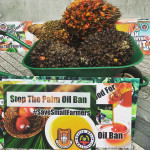
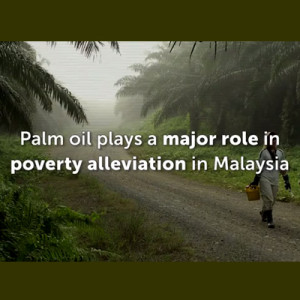
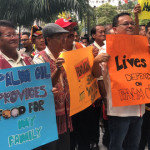


Leave a Reply